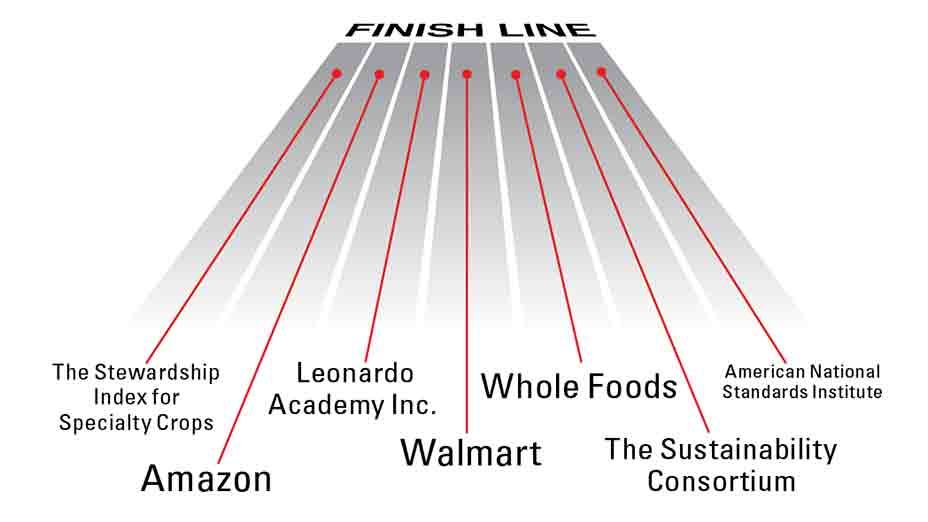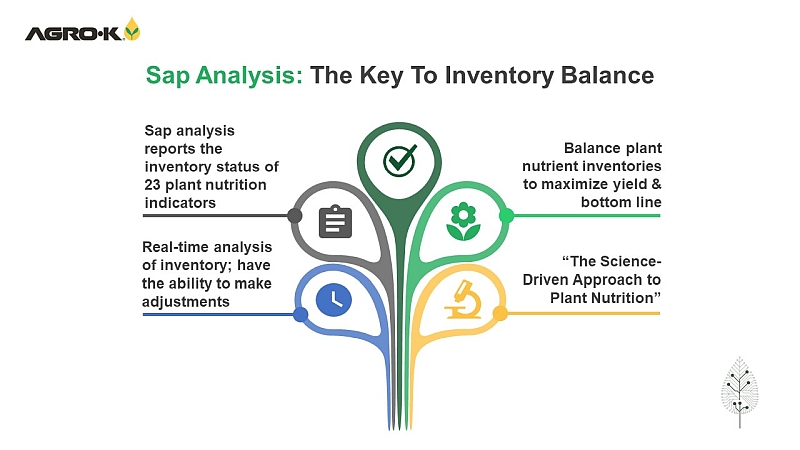Whose Sustainable Standard Wins?

Ever get the feeling this produce business is a track and field meet, and every time you think you’ve finally cleared the last hurdle, you see a new one added in the distance?
Earlier this year, the Leonardo Academy Inc., who claim to be “The Sustainability Experts” — not to be confused with the Leopold Center for Sustainable Ag at Iowa State University, which was recently defunded — announced they had signed an agreement with the American National Standards Institute (ANSI) to accredit certifiers for ANSI/LEO-4000, which is the American National Standard for Sustainable Agriculture.
The goal is to test and certify auditors. It’s surprising to learn that this Leonardo group created national standards for all sustainable ag. After all, we already have The Sustainability Consortium and The Stewardship Index for Specialty Crops, which is developing standards using scientifically based metrics.
If the Leonardo Academy standards are to be the standards for the industry, we should take a look at what’s involved. Unfortunately, in order to learn what those sustainability standards are, one has to pay a certifier’s application fee to access the manuals.
It’s tough to meet standards if you can’t read the rules.
Meanwhile, Retailers Are One-Upping Each Other
A couple of years ago, both Walmart and Whole Foods had adopted sustainability as the next attribute that they hoped would set their produce departments (as well as the rest of the store) ahead of the competition. To those ends, they were setting new rules by which their suppliers would have to comply.
While Walmart joined The Sustainability Consortium and is using that set of industry-developed standards, Whole Foods’ Responsibly Grown program is their home-grown vision of sustainability.
Now that Amazon is in the process of purchasing Whole Foods (which will create another set of rules for growers/shippers to play by), ‘sustainability,’ whether defined by Amazon/Whole Foods, Walmart, or the Leopold Academy, will likely require another certification audit.
In the meantime, while the dust is not even beginning to settle around food safety hurdles, several retailers have been working on new directives to allow them to stand out from the crowd. Walmart has been pushing traceability to the forefront, hoping that one day a fruit or vegetable could be tracked from the consumer all the way to the field in which it was grown with the push of a computer key or a scan of a barcode.
How We Got Here
It’s worth understanding a little history here.
The first salvo was fired in the late 1980s when the Ralph’s supermarket chain in California adopted the NutriClean certification program to be able to claim their produce was inspected and certified to be pesticide free.
That initial hurdle was cleared, with much industry protest and clarification from growers supplying competing chains that it was not a legitimate claim. No longer providing a competitive advantage, pesticide-free certification faded in importance. At the same time, increasing reports linking fresh produce to foodborne illnesses led to a new set of hurdles.
Over the past 20 years, there have been great advances in improving production, monitoring, handling, and certification systems in order to minimize the chances for contaminating fresh produce from field to fork. Yet, it still remains subject to a system lacking a uniform set of standards to level the playing field.
While implementation of the federal rules under the Food Safety Modernization Act should set a standard base level, and most retailers accept the ‘harmonized’ audit, several of the bigger players still require a different audit or have added an extra set of questions to meet their specific criteria.
Ultimately, It’s About Attracting Consumers
With the quality of the produce department often cited as the number one reason for selecting and continuing to shop at a particular retail grocery store, it is no wonder that a game of fruit and veggie one-upmanship has been playing out among grocers.
What started as simply having the freshest, cleanest, or greatest variety of produce in the section, has turned into a contest to see who can add another hurdle or raise the bar to ever higher standards.
You might be grumbling that the standards required by retailers may be superficial, unobtainable, or highly subjective. You might be asking, “Who’s paying for these new audits?” However, if you want to play the game and sell to these merchants, you have to play by the rules — their rules! And we all know that other marketing adage: The customer is always right!
Richard VanVranken specializes in small farms, farm marketing, and helping growers find a market for non-traditional crops. He is also Professor and County Extension Department Head of Rutgers Cooperative Extension of Atlantic County in New Jersey.










